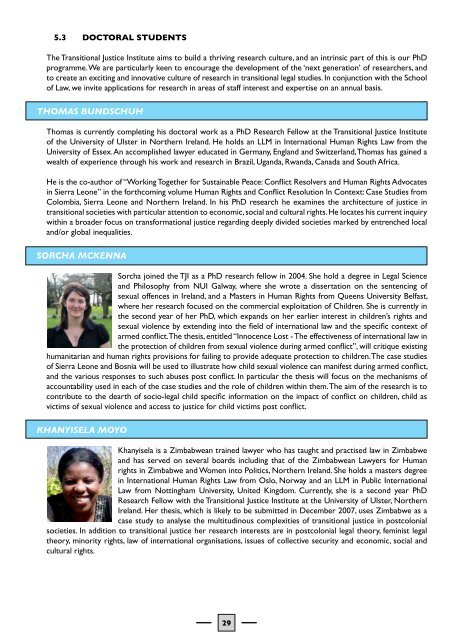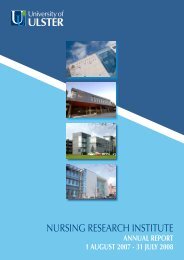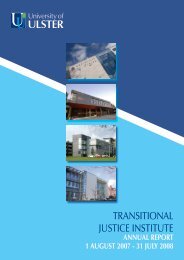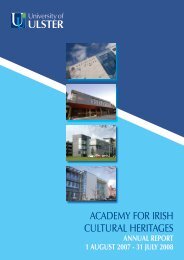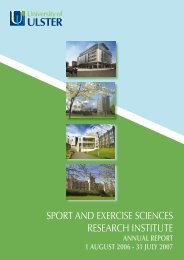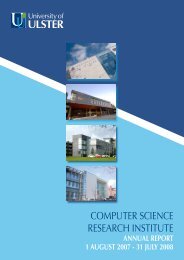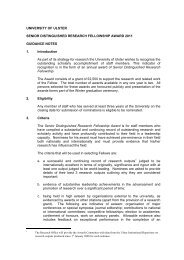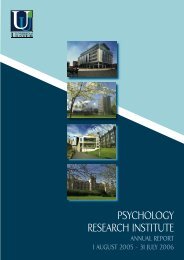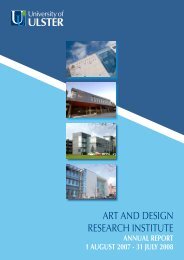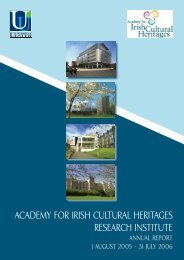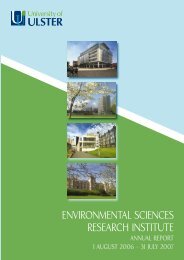transitional justice research institute - University of Ulster
transitional justice research institute - University of Ulster
transitional justice research institute - University of Ulster
Create successful ePaper yourself
Turn your PDF publications into a flip-book with our unique Google optimized e-Paper software.
5.3 DOCTORAL STUDENTS<br />
The Transitional Justice Institute aims to build a thriving <strong>research</strong> culture, and an intrinsic part <strong>of</strong> this is our PhD<br />
programme. We are particularly keen to encourage the development <strong>of</strong> the ‘next generation’ <strong>of</strong> <strong>research</strong>ers, and<br />
to create an exciting and innovative culture <strong>of</strong> <strong>research</strong> in <strong>transitional</strong> legal studies. In conjunction with the School<br />
<strong>of</strong> Law, we invite applications for <strong>research</strong> in areas <strong>of</strong> staff interest and expertise on an annual basis.<br />
Thomas Bundschuh<br />
Thomas is currently completing his doctoral work as a PhD Research Fellow at the Transitional Justice Institute<br />
<strong>of</strong> the <strong>University</strong> <strong>of</strong> <strong>Ulster</strong> in Northern Ireland. He holds an LLM in International Human Rights Law from the<br />
<strong>University</strong> <strong>of</strong> Essex. An accomplished lawyer educated in Germany, England and Switzerland, Thomas has gained a<br />
wealth <strong>of</strong> experience through his work and <strong>research</strong> in Brazil, Uganda, Rwanda, Canada and South Africa.<br />
He is the co-author <strong>of</strong> “Working Together for Sustainable Peace: Conflict Resolvers and Human Rights Advocates<br />
in Sierra Leone” in the forthcoming volume Human Rights and Conflict Resolution In Context: Case Studies from<br />
Colombia, Sierra Leone and Northern Ireland. In his PhD <strong>research</strong> he examines the architecture <strong>of</strong> <strong>justice</strong> in<br />
<strong>transitional</strong> societies with particular attention to economic, social and cultural rights. He locates his current inquiry<br />
within a broader focus on transformational <strong>justice</strong> regarding deeply divided societies marked by entrenched local<br />
and/or global inequalities.<br />
Sorcha McKenna<br />
Sorcha joined the TJI as a PhD <strong>research</strong> fellow in 2004. She hold a degree in Legal Science<br />
and Philosophy from NUI Galway, where she wrote a dissertation on the sentencing <strong>of</strong><br />
sexual <strong>of</strong>fences in Ireland, and a Masters in Human Rights from Queens <strong>University</strong> Belfast,<br />
where her <strong>research</strong> focused on the commercial exploitation <strong>of</strong> Children. She is currently in<br />
the second year <strong>of</strong> her PhD, which expands on her earlier interest in children’s rights and<br />
sexual violence by extending into the field <strong>of</strong> international law and the specific context <strong>of</strong><br />
armed conflict. The thesis, entitled “Innocence Lost - The effectiveness <strong>of</strong> international law in<br />
the protection <strong>of</strong> children from sexual violence during armed conflict”, will critique existing<br />
humanitarian and human rights provisions for failing to provide adequate protection to children. The case studies<br />
<strong>of</strong> Sierra Leone and Bosnia will be used to illustrate how child sexual violence can manifest during armed conflict,<br />
and the various responses to such abuses post conflict. In particular the thesis will focus on the mechanisms <strong>of</strong><br />
accountability used in each <strong>of</strong> the case studies and the role <strong>of</strong> children within them. The aim <strong>of</strong> the <strong>research</strong> is to<br />
contribute to the dearth <strong>of</strong> socio-legal child specific information on the impact <strong>of</strong> conflict on children, child as<br />
victims <strong>of</strong> sexual violence and access to <strong>justice</strong> for child victims post conflict.<br />
Khanyisela Moyo<br />
Khanyisela is a Zimbabwean trained lawyer who has taught and practised law in Zimbabwe<br />
and has served on several boards including that <strong>of</strong> the Zimbabwean Lawyers for Human<br />
rights in Zimbabwe and Women into Politics, Northern Ireland. She holds a masters degree<br />
in International Human Rights Law from Oslo, Norway and an LLM in Public International<br />
Law from Nottingham <strong>University</strong>, United Kingdom. Currently, she is a second year PhD<br />
Research Fellow with the Transitional Justice Institute at the <strong>University</strong> <strong>of</strong> <strong>Ulster</strong>, Northern<br />
Ireland. Her thesis, which is likely to be submitted in December 2007, uses Zimbabwe as a<br />
case study to analyse the multitudinous complexities <strong>of</strong> <strong>transitional</strong> <strong>justice</strong> in postcolonial<br />
societies. In addition to <strong>transitional</strong> <strong>justice</strong> her <strong>research</strong> interests are in postcolonial legal theory, feminist legal<br />
theory, minority rights, law <strong>of</strong> international organisations, issues <strong>of</strong> collective security and economic, social and<br />
cultural rights.<br />
29


